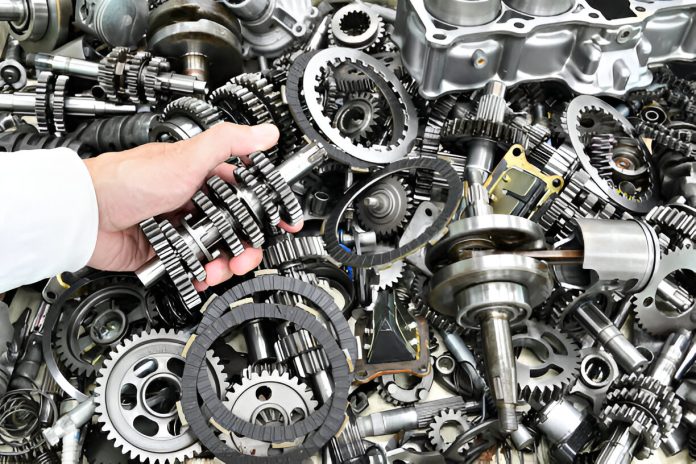For businesses relying on machinery, finding a reliable machinery parts wholesaler can make a major difference in operational efficiency and cost savings.
Whether you’re in construction, manufacturing, or agriculture, having a trusted source for wholesale machinery parts can keep your operations running smoothly.
This blog will help you deal with the complexities of choosing the best wholesaler for your needs, ensuring you get the right parts at the best prices.

Importance of Wholesale Machinery Parts Suppliers
Wholesale machinery parts suppliers are crucial for businesses that depend on heavy machinery. They provide bulk purchasing options that can significantly reduce costs. These suppliers often have extensive inventories, ensuring that you can find the specific parts you need without long waiting times. Additionally, dealing with wholesalers can lead to the development of long-term business relationships, which can result in better service and more favorable terms over time.
7 Things to Identify Top Machinery Parts Suppliers
Selecting the right supplier is not just about finding a provider with the lowest prices. It involves a comprehensive evaluation of several factors to ensure you get the best value and service.
Machinery Knowledge
One of the first things to look for in a machinery parts wholesaler is their knowledge of the products they sell. A supplier with deep understanding can offer valuable advice on the best parts for your specific machinery. They can help troubleshoot issues and recommend parts that enhance the performance and longevity of your equipment.
A knowledgeable supplier stays up-to-date with the latest industry trends and technologies. They can guide you through the process of selecting parts that are compatible with your machinery and provide insights into potential upgrades.
Years of Experience
Experience matters. Suppliers with many years in the industry have established relationships with manufacturers and have honed their supply chain processes. This experience translates to better reliability, faster delivery times, and, often, better prices. When evaluating potential suppliers, consider those who have been in the business for a substantial period.
An experienced supplier is likely to have a proven track record of delivering high-quality parts consistently. Their experience in the market is proof of their reliability and customer satisfaction.
Customer Reviews
Customer reviews and testimonials can provide insights into a supplier’s reliability and quality of service. Look for suppliers with consistently positive feedback. Online reviews on platforms like Google, Yelp, and industry-specific forums can be very telling. Don’t just look at the overall rating—read individual reviews to understand the specifics of customers’ experiences.
Pay attention to reviews that mention the quality of the parts, the accuracy of order fulfillment, and the supplier’s responsiveness to inquiries and issues. Moreover, reach out to businesses in your industry for recommendations.
Communication Clarity
Clear communication is a basic need in any business relationship. Your supplier should be responsive and transparent. They should provide clear information about product availability, pricing, and delivery times. Good communication helps prevent misunderstandings and ensures that you get what you need when you need it.
A supplier who communicates clearly will also keep you informed about any potential delays or issues with your order. They should be proactive in providing updates and addressing any concerns you might have.
Cost Efficiency
While cost shouldn’t be the only factor, it’s certainly important. Compare prices from different suppliers to ensure you’re getting a fair deal.
Keep in mind that the cheapest option isn’t always the best. Check the overall value, which includes quality, service, and reliability. Sometimes, paying a little more saves you money in the long run.
Opt for someone who offers competitive pricing without compromising on quality. Some distributors offer discounts for bulk purchases or long-term contracts.
Variety of Products
A top machinery parts wholesaler should offer a wide range of products. This variety ensures you can find all the parts you need from a single supplier, saving you time and simplifying your procurement process. It also indicates that the supplier is well-established and has strong relationships with multiple manufacturers.
A diverse product range allows you to source parts for different types of machinery, reducing the need to deal with multiple suppliers.
Product Quality
The quality of the parts you purchase requires major consideration. Poor-quality parts can lead to frequent breakdowns, higher maintenance costs, and even safety issues.
Ensure that the provider offers high-quality products that meet industry standards. Ask about the origin of their parts and any quality control processes they have in place.
High-quality parts are important for maintaining the efficiency and safety of your machinery. Inferior parts can cause damage to your equipment and result in costly repairs.
Wrap Up!
Choosing the right machinery parts wholesaler involves careful consideration of several factors. By focusing on their knowledge, you can find a supplier that meets your needs and helps your business thrive.
Building a strong relationship with a reliable wholesaler can lead to better service, improved operational efficiency, and, ultimately, a more profitable business. In conclusion, the process of selecting a machinery parts wholesaler may seem daunting, but by evaluating these key factors, you can make an informed decision that will benefit your business in the long run.








